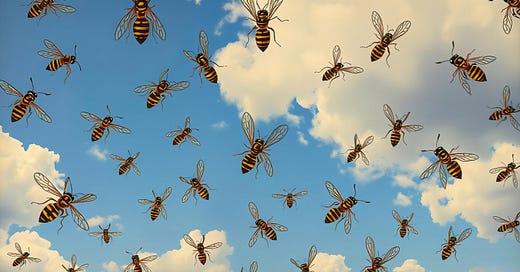Hey, folks! Back again with a fresh batch of things I didn’t know last week. Highlights include a wasp that feels like a volcano, a 3D-printed train station built overnight, and a Roman tax scam that wouldn’t look out of place today.
Here’s today’s selection:
Entomologist Justin Schmidt rated the sting of the Synoeca septentrionalis wasp a 4—the highest on his pain scale—calling it “torture” and comparing it to being “chained in the flow of an active volcano.”
In 2012, around 13% of U.S. high school students smoked; by 2021, that number had dropped to under 2%. Vaping followed a similar trend—after peaking at over 27% in 2019, it fell to under 12% by 2021.
The Aral Sea’s disappearance has made rock deep beneath it rise and slowly flow, moving a few millimetres each year.
A growing number of websites once used to train AI models are now blocking access, making chunks of key datasets off-limits. In total, 5% of all data—and a quarter of the best sources—have been cut off using old-school robots.txt files.
In 2024, clean energy supplied over 40% of the world’s electricity for the first time since the 1940s, thanks to a big jump in solar power. Solar made up nearly 7% of global electricity, wind just over 8%, and hydro stayed at 14%, still the biggest renewable source.
Dire wolves went extinct 13,000 years ago, but scientists have now bred grey wolf pups with genes from their ancient relatives, including those for large bodies and pale, thick coats. Though dire and grey wolves are over 99% genetically alike, 80 genes stood out, many linked to size and fur traits.
In March 2025, workers in rural Japan replaced a 75-year-old wooden station with a new one, assembled from 3D-printed parts, in just six overnight hours.
House sparrow numbers in London dropped 71% between 1994 and 2019, likely due to tidier gardens and avian malaria.
In 1987, hundreds of Cuban detainees—trapped in U.S. prisons with no way to stay or return home—rioted after learning they’d be deported to Cuba. They seized federal prisons in Oakdale and Atlanta, demanding protection from forced repatriation; the government ultimately agreed to pause the deportations.
Russia saw its lowest birth numbers since the early 1800s in the first quarter of 2025, with February hitting a 200-year low.
Pollinator loss is cutting the supply of healthy foods and is already linked to around 500,000 early deaths globally each year.
A 2022 survey found that 37% of women and 24% of men avoid quiet places like parks after dark due to safety concerns. Parks feel less safe when they’re poorly lit, overgrown, neglected, or empty, especially of families and women.
A newly analysed manuscript from the Judean desert reveals a Roman-era tax evasion case involving forgery, fake slave sales, and fraud—unfolding in Judea and Arabia around 130 A.D., during Hadrian’s reign.
By 2030, U.S. datacentres—driven largely by AI—will use more electricity than the entire heavy manufacturing sector, including steel, cement, and chemicals, says the International Energy Agency.
What I’ve been reading
The wondrous connections between mathematics and literature: “I finally read ‘Moby-Dick,’ and was delighted to find that it abounds with mathematical metaphors. I realised further it’s not just Herman Melville; Leo Tolstoy writes about calculus, James Joyce about geometry. Fractal structure underlies Michael Crichton’s ‘Jurassic Park’ and algebraic principles govern various forms of poetry.”
Vintage dinosaur art: Konstantin Flyorov: “Flyorov was a master of many styles, both realistic and heavily stylised in ways that even the most out-there Western palaeoart rarely got.”
Call me comrade: “In 1943, emotive coverage of the Battle of Stalingrad prompted some American women to reach out spontaneously, dropping heartfelt notes into mailboxes addressed simply to ‘A woman, Russia’. The State Department and FBI seemed willing to turn a blind eye—perhaps, because the participants were all women and therefore regarded as harmless.”
From my inbox
Sam Matey of The Weekly Anthropocene interviews Rex Hansen, a digital twin cartographer.
Mike Durham summarises his life in 17 paragraphs.
In Predirections, Jonathan Tonkin reflects on distinguishing science from activism.
That’s it for today! Thanks for reading! If you enjoy the newsletter, share it with a friend—or a dozen. And if you really enjoyed it, consider upgrading to a paid subscription—it helps support my work and means a lot.
Elia Kabanov is a science writer covering the past, present and future of technology (@metkere)
Illustration: Elia Kabanov feat. Picsart.




